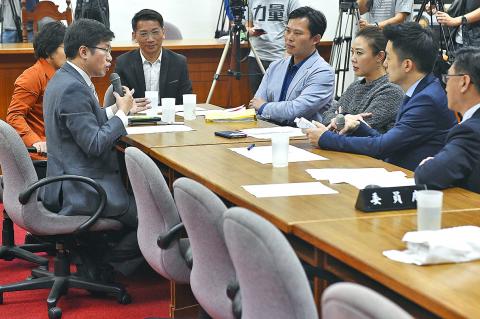Efforts to pass a legislative resolution condemning the citation of the “one China” principle in a WHO invitation letter stalled yesterday after cross-caucus negotiations broke down because of Chinese Nationalist Party (KMT) opposition.
“The KMT’s stance is that there is no need for us to tango with the Democratic Progressive Party [DPP] and the New Power Party [NPP] because the only reason we received an invitation using this kind of language is because of the ideology of the incoming administration,” KMT Legislator Lee Yan-hsiu (李彥秀) said. “If the DPP and NPP want to respond, they should do so under the banners of their individual caucuses, rather than using a legislative resolution.”
The nation’s invitation to participate in this year’s World Health Assembly — to be held from Monday to Saturday next week — begins by “recalling” UN Resolution 2758, which in 1971 recognized the People’s Republic of China at the expense of the Republic of China, and goes on to say that the invitation is in line with the “one China” principle.

Photo: Chen Chih-chu, Taipei Times
KMT opposition to an NPP resolution condemning the letter’s wording during a meeting of the general legislative session last week automatically confined it to cross-caucus negotiations.
Yesterday’s negotiations were called by the NPP, following the failure of similar talks convened by Legislative Speaker Su Jia-chyuan (蘇嘉全) on Friday last week.
The KMT delegation refused to agree to a general assembly floor debate and vote, while declining to state whether their party would present an alternative resolution, stating that they would hold further discussions with caucus members.
“Diplomacy is extremely subtle, so for us to force through a resolution in a limited amount of time could create complications,” KMT Legislator Chiang Wan-an (蔣萬安) said. “We don’t want any resolution to result in regrets by causing our executive team to lose the opportunity to participate.”
The NPP delegation expressed regret at the KMT boycott, with DPP legislators threatening procedural moves to force a vote later this week.
“Today’s result is extremely regrettable — while the legislatures of allied countries have already passed resolutions, in the legislature of our own nation we do not even have the opportunity to substantially discuss a resolution on the legislative floor,” NPP Executive Chairman Huang Kuo-chang (黃國昌) said. “This shouldn’t be about ‘tangoing’ with us — our purpose in raising this resolution was to give our executive team full legislative support when they go to the [WHA] meeting.”
“We originally hoped the KMT would put forward its own version of a resolution — but all it has put forward today is its stance,” DPP Legislator Lo Chih-cheng (羅致政) said, adding that it would be possible to force a vote if negotiations have no prospect of reaching a compromise.
The Act Governing the Exercise of Legislative Power (立法院職權行使法) stipulates that a general legislative session can address matters for which cross-caucus negotiations fail to reach a consensus after a month.
“We feel that the WHO is a nonpartisan issue — but if the KMT is not willing to issue a joint statement, we will simply pass a joint resolution instead,” Lo said.

Taiwanese can file complaints with the Tourism Administration to report travel agencies if their activities caused termination of a person’s citizenship, Mainland Affairs Council Minister Chiu Chui-cheng (邱垂正) said yesterday, after a podcaster highlighted a case in which a person’s citizenship was canceled for receiving a single-use Chinese passport to enter Russia. The council is aware of incidents in which people who signed up through Chinese travel agencies for tours of Russia were told they could obtain Russian visas and fast-track border clearance, Chiu told reporters on the sidelines of an event in Taipei. However, the travel agencies actually applied

New measures aimed at making Taiwan more attractive to foreign professionals came into effect this month, the National Development Council said yesterday. Among the changes, international students at Taiwanese universities would be able to work in Taiwan without a work permit in the two years after they graduate, explainer materials provided by the council said. In addition, foreign nationals who graduated from one of the world’s top 200 universities within the past five years can also apply for a two-year open work permit. Previously, those graduates would have needed to apply for a work permit using point-based criteria or have a Taiwanese company

The Shilin District Prosecutors’ Office yesterday indicted two Taiwanese and issued a wanted notice for Pete Liu (劉作虎), founder of Shenzhen-based smartphone manufacturer OnePlus Technology Co (萬普拉斯科技), for allegedly contravening the Act Governing Relations Between the People of the Taiwan Area and the Mainland Area (臺灣地區與大陸地區人民關係條例) by poaching 70 engineers in Taiwan. Liu allegedly traveled to Taiwan at the end of 2014 and met with a Taiwanese man surnamed Lin (林) to discuss establishing a mobile software research and development (R&D) team in Taiwan, prosecutors said. Without approval from the government, Lin, following Liu’s instructions, recruited more than 70 software

Taiwanese singer Jay Chou (周杰倫) plans to take to the courts of the Australian Open for the first time as a competitor in the high-stakes 1 Point Slam. The Australian Open yesterday afternoon announced the news on its official Instagram account, welcoming Chou — who celebrates his 47th birthday on Sunday — to the star-studded lineup of the tournament’s signature warm-up event. “From being the King of Mandarin Pop filling stadiums with his music to being Kato from The Green Hornet and now shifting focus to being a dedicated tennis player — welcome @jaychou to the 1 Point Slam and #AusOpen,” the